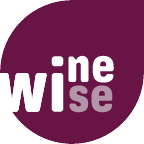Hungry for more!
Sara & Adriaan from ‘Hungry for More’ followed the WSET level 2 course at WineWise and described the journey.
‘We recently completed the WSET wine training (level 2) at WineWise. Today we would like to share our experiences. It was an exciting journey through the wonderful world of wines. One that leaves you wanting more: more knowledge, more wine and more experience.
Wine… It is a very fascinating theme that immediately makes you happy. Happy moments, delicious meals, beautiful journeys, every association makes a certain wine unique for someone. As nice as they are, such associations should not be used as criteria for judging wines. This requires objective standards that are as separate as possible from a person’s personal taste preferences or experiences. That is one of the first and most important guidelines in the WSET approach that promotes an objective and systematic way of testing. If you really want to build up wine knowledge and be able to assess a wine correctly, you cannot ignore this method. That is why the WSET today is regarded as the educational institution when it comes to wine education. In Belgium, they are represented by WiseWise, which helps students of all levels – from professionals in the hospitality and wine business to hobbyists – to brush up on their wine knowledge. This is based on theory in order to better understand and apply practice.
Recently, we enjoyed immersing ourselves in the wonderful world of wines during the WSET level 2 course at WineWise in Antwerp with Sybille Troubleyn and Piet Vannieuwenhuyse. Piet & Sybille also teach the different levels of the course in other places in Belgium, they organise thematic master classes or provide in-house training at companies active in the wine sector.
At the start of the course, the quality of the training and the group immediately stood out. Known faces active in renowned restaurants, wine bar managers, aspiring sommeliers and even bloggers with a healthy interest :-), the participants of the course all had one thing in common: a strong drive and an enormous desire to learn more about learn wine. In contrast to the majority of wine courses that you can take, e;g., at wine merchants or in hobby clubs (and which certainly also have their usefulness and target group), the WSET is not about drinking or tasting wine. However, it is about understanding the wines, and that includes both theoretical knowledge and practical application. After all, in order to understand how a particular wine should taste based on the facts (and the info on the label), it is necessary to know more about the grape variety, the climate, the soil, the winemaker, the aging of the wine after harvesting, the way the wine is stored, and so on.
The WSET course (level 2) at WineWise is very logically structured. Theory is always alternated with trial sessions. In this way it not only remains exciting and fascinating during the lesson, but you also immediately learn to use the subject matter in concrete cases. As a result, the knowledge sticks much better. In fact, they always work ‘brand neutral’ when testing. The focus is on the variety of the grape, the region and the process of production and storage, not the house.
We start the course with general info about the winemaking process. From planting the vines, growing and harvesting the grapes, to making and storing the wine, all this info is explained in detail. Subsequently, the taste profile of various wines is considered and a jump is made to ‘food & wine’ pairing, so that you understand why a certain wine goes well with a certain dish. The general guidelines on this can be found in an article we wrote about the food & wine pairing guidelines of the WSET.
The main part of the course concerns the discussion of the different grape varieties. The starting point is to always consider the regions, the winemaking processes and possibly the commercial or other aspects. Successively, Chardonnay, Pinot Noir, Sauvignon Blanc, Merlot and Cabernet Sauvignon are reviewed. But also local grape varieties such as South African Pinotage or Chenin Blanc are discussed.
Time for the real work… and that’s the homework. The WSET course is linked to an exam that is mandatory if one wants to ‘continue to evolve’ to the next level. Although most people don’t like to dive into textbooks, the exam system is definitely a good thing because it forces you to actively engage with the material. And that is exactly where the WSET training makes the difference. By really understanding the wines, you will appreciate them
At the end of the course, sherry, port and spirits are briefly discussed, so that the students have a solid basic knowledge.
We found our participation in the WSET training to be a very exciting experience. We realise that we only know a little about wine, and that there is still a lot to discover. And that is exactly what stimulates curiosity and motivation.’
Guest authors : Sarah De Hondt & Adriaan Van Looy – Hungry for More









